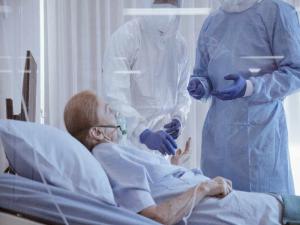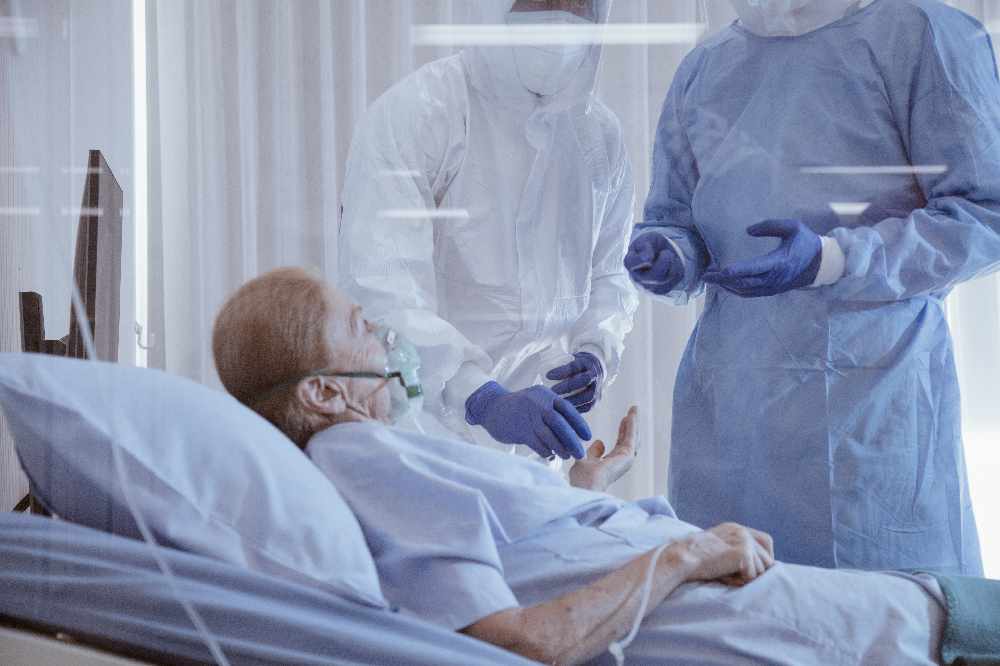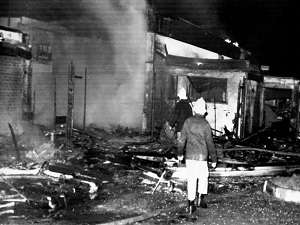
By David Young, PA
Extra ICU beds are being made available in Belfast as hospitals struggle to cope with a surge in Covid-19 admissions.
Northern Ireland’s chief nursing officer Charlotte McArdle said beds for Belfast health trust patients are being made available at Belfast City Hospital due to capacity issues at the Royal Victoria and Mater hospitals.
Ms McArdle said the numbers in ICU had increased significantly in Northern Ireland over the weekend, with 27 Covid-19 patients in intensive care as of Sunday.
Ms McArdle said there was currently no plan to reopen the region-wide Nightingale facility at Belfast City Hospital but she warned that would become a “very real possibility” if the surge continues.
The senior nurse’s comments came after both the Belfast Trust and the South Eastern Trust issued emergency appeals to off-duty staff on Sunday to come in to work to help colleagues deal with the escalating situation.
Ms McArdle said around 60% of those being admitted to hospital in Belfast had not been vaccinated.
She said an increasing number of young people were also being admitted to hospital with the disease.

In Northern Ireland, only 56% of people aged 18-29 have come forward for vaccination to date, an uptake rate that is causing concern about senior health officials.
“The Belfast trust are planning to open additional Covid ICU beds in the BCH (Belfast City Hospital) on the ground floor which would be for Belfast patients,” Ms McArdle told BBC Radio Ulster’s Nolan Show.
“We haven’t yet made a decision to reopen regional Nightingale, but if this pressure continues that’s a very real possibility and, of course, that comes with complications and other decisions that need to be made around the balance in keeping surgery going.”
She said all five health trusts in Northern Ireland were under increasing pressures.
“All our trusts are having extreme difficulties coping, the health and social care system across all our trusts are struggling to cope with the current levels of demand for care,” she said on Monday morning.
“It’s impacting on the emergency departments, on GP services, on the ambulance service, and in all areas really.
“The five trusts today are in extreme escalation and at the moment across the five trusts there are 190 people waiting more than 12 hours for hospital admission.”
Ms McArdle said hospitals were having to deal with an increase in Covid-19 admissions at a time when accident and emergency departments were already under severe pressure with patients reporting with other illnesses and injuries.
She said staff absence rates has also increased significantly in the last week.
The chief nurse said the pressure on ICUs ramped up over the weekend.
The Belfast and South Eastern trusts issued the emergency callouts to off-duty staff on Sunday evening.
** Trust Staff **
— South Eastern Trust (@setrust) July 25, 2021
We are currently experiencing pressures in the system and would appeal for any Trust staff who can help out this evening to contact their Department Manager.
The Belfast Trust said there was “extreme pressure” in the Royal Victoria and Mater hospitals due to emergency admissions and the increasing numbers of Covid-19 patients.
The South Eastern Trust tweeted on Sunday: “We are currently experiencing pressures in the system and would appeal for any trust staff who can help out this evening to contact their department manager.”
Referencing a social media post by the Belfast Trust, Health Minister Robin Swann tweeted: “This is not an ask that a trust makes easily of its staff, but unfortunately it is necessary as we continue to maintain the services that are expected.
“My enduring thanks to all our health staff who do so much for all of us.”
The trust appeals came on the day when Northern Ireland passed the one million landmark for people in the region who are fully vaccinated.
Around 70% of the adult population have received both doses of the Covid-19 vaccine.
However, while uptake has been high in older age groups, many younger people in Northern Ireland are still not coming forward to get jabbed.
Ms McArdle added: “There is an increasing number of young people requiring a very high level of acute care in some of our hospitals settings at the moment.”


 Police launch murder probe following ‘brutal and senseless’ death of woman
Police launch murder probe following ‘brutal and senseless’ death of woman
 More than 5,000 NI children set to spend Christmas in temporary accommodation
More than 5,000 NI children set to spend Christmas in temporary accommodation
 No evidence of police collusion in 1978 La Mon bombing
No evidence of police collusion in 1978 La Mon bombing
 Sex offender who targeted girls online across the UK jailed for 27 years
Sex offender who targeted girls online across the UK jailed for 27 years
 Pre-trial rulings due in Bloody Sunday prosecution of Soldier F
Pre-trial rulings due in Bloody Sunday prosecution of Soldier F